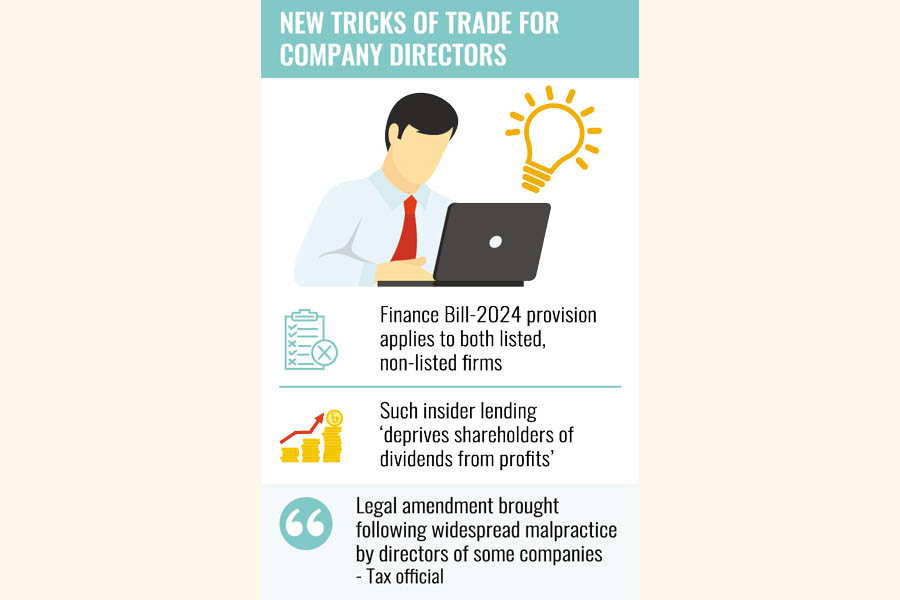
Published :
Updated :

Any loan disbursed to its directors by a company, be it publicly listed or non-listed, will be considered their taxable income under provision of the proposed budget for the fiscal 2024-25.
The Finance Bill 2024 provides that if a company has accumulated profit in its balance sheet, its directors have to pay tax at regular rate as 'dividend income' for borrowing from their own company.
For example, if a company accumulates profit worth Tk10 million and disburses the same amount as loan to its directors, the entire amount will be considered taxable.
In case of a lower amount of accumulated profit, such as Tk 5.0 million, but disbursed loan is Tk 10 million, then taxmen will consider Tk 5.0 million as taxable income.
Currently, only private companies' directors are supposed to pay such tax on loan if taken from their own companies.
In the Finance Bill 2024, such taxation principle aims to discourage obtaining loan from own companies so that listed companies can issue more dividends to their shareholders.
Talking to the FE, Ikhtiar Uddin Mohammad Mamun, Director-General of the BCS (Tax) Academy, said currently private company directors are under the purview of the fiscal measure which has been proposed for all types of companies in this finance bill.
The move has been made to bring parity between listed and non-listed companies, he explains.
"Companies having accumulated profits in previous years in tax returns or companies' balance sheet but incurred loss in current tax year would also fall under the new tax measures. Tax would be imposed on their directors in case of taking loan from the companies."
The loan amount would be considered "income from financial asset", he adds.
According to the Income Tax Act 2023, any loan is treated as liabilities on an individual taxpayer and it is tax-free if taken from other companies.
However, the National Board of Revenue (NBR) considers it 'income from financial assets' if any company disburses loan to its own directors.
A senior tax official says the amendment has been done following widespread malpractice by directors of some companies who are taking loan by depriving shareholders of their dividends from profits.
"If a company has accumulated profit, it is supposed to pay dividend to its shareholders, not loan to its directors," he categorically says about financial flaws of such insider lending.
Currently, the highest tax rate on individual taxpayers is 30 per cent.
The tax official says directors of a company would have to pay tax, on the basis of their annual-income slab, on the amount of loan if taken from one's own company, at rates up to 30 per cent.
However, if any company issues dividend to another company, its recipient would have to pay 20-percent tax.
A senior tax member says the tax rate for companies on dividend income has been kept lower than that of individual tax rates to encourage the formation of companies.
Ahmed Rashid Lali, former president of the DSE Brokers Association, says listed companies can disburse loan to their directors but an interest at market rate is payable on the debt.
"Already an advance income tax at 10 per cent is levied on divided income of a director," he mentions.
Mohammad Rezaul Karim, Executive Director (general) of Bangladesh Securities and Exchange Commission (BSEC), mentions that there is no barrier to payment of loan under BSEC regulation.
However, a company's own 'Memorandum of Articles' determines whether it should lend to its shareholders.
doulotakter11@gmail.com


 For all latest news, follow The Financial Express Google News channel.
For all latest news, follow The Financial Express Google News channel.